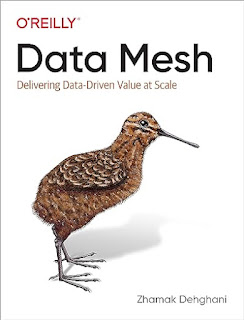| Zhamak Dehghani's "Data Mesh: Delivering Data-Driven Value at Scale" (2021) is a must read book for the data professional. So, here I am, finally managing to read it and give it some thought, even if it will probably take more time and a few more reads for the ideas to grow. Working in the fields of Business Intelligence and Software Engineering for almost a quarter-century, I think I can understand the historical background and the direction of the ideas presented in the book. There are many good ideas but also formulations that make me circumspect about the applicability of some assumptions and requirements considered. So, after data marts, warehouses, lakes and lakehouses, the data mesh paradigm seems to be the new shiny thing that will bring organizations beyond the inflection point with tipping potential from where organization's growth will have an exponential effect. At least this seems to be the first impression when reading the first chapters. |
||
|
The book follows to some degree the advocative tone of promoting that "our shiny thing is much better than previous thing", or "how bad the previous architectures or paradigms were and how good the new ones are" (see [2]). Architectures and paradigms evolve with the available technologies and our perception of what is important for businesses. Old and new have their place in the order of things, and the old will continue to exist, at least until the new proves its feasibility. The definition of the data mash as "a sociotechnical approach to share, access and manage analytical data in complex and large-scale environments - within or across organizations" [1] is too abstract even if it reflects at high level what the concept is about. Compared to other material I read on the topic, the book succeeds in explaining the related concepts as well the goals (called definitions) and benefits (called motivations) associated with the principles behind the data mesh, making the book approachable also by non-professionals. Built around four principles "data as a product", "domain-oriented ownership", "self-serve data platform" and "federated governance", the data mesh is the paradigm on which data as products are developed; where the products are "the smallest unit of architecture that can be independently deployed and managed", providing by design the information necessary to be discovered, understood, debugged, and audited. It's possible to create Lego-like data products, data contracts and/or manifests that address product's usability characteristics, though unless the latter are generated automatically, put in the context of ERP and other complex systems, everything becomes quite an endeavor that requires time and adequate testing, increasing the overall timeframe until a data product becomes available. The data mesh describes data products in terms of microservices that structure architectures in terms of a collection of services that are independently deployable and loosely coupled. Asking from data products to behave in this way is probably too hard a constraint, given the complexity and interdependency of the data models behind business processes and their needs. Does all the effort make sense? Is this the "agility" the data mesh solutions are looking for? Many pioneering organizations are still fighting with the concept of data mesh as it proves to be challenging to implement. At a high level everything makes sense, but the way data products are expected to function makes the concept challenging to implement to the full extent. Moreover, as occasionally implied, the data mesh is about scaling data analytics solutions with the size and complexity of organizations. The effort makes sense when the organizations have a certain size and the departments have a certain autonomy, therefore, it might not apply to small to medium businesses. Previous Post <<||>> Next Post References: |
|||
A Software Engineer and data professional's blog on SQL, data, databases, data architectures, data management, programming, Software Engineering, Project Management, ERP implementation and other IT related topics.
Pages
- 🏠Home
- 🗃️Definitions
- 🔢SQL Server
- 🎞️SQL Server: VoD
- 🏭Fabric
- 🎞️Fabric: VoD
- ⚡Power BI
- 🎞️Power BI: VoD
- 📚Data
- 📚Engineering
- 📚Management
- 📚SQL Server
- 🎞️D365: VoD
- 📚Systems Thinking
- ✂...Quotes
- 🧾D365: GL
- 💸D365: AP
- 💰D365: AR
- 🏠D365: FA
- 👥D365: HR
- ⛓️D365: SCM
- 🔤Acronyms
- 🪢Experts
- 🔠Dataviz & BI
- 🔠D365
- 🔠Fabric
- 🔠Engineering
- 🔠Management
- 🔡Glossary
- 🌐Resources
- 🏺Dataviz
- 🗺️Social
- 📅Events
- ℹ️ About
13 March 2024
🔖Book Review: Zhamak Dehghani's Data Mesh: Delivering Data-Driven Value at Scale (2021)
Subscribe to:
Post Comments (Atom)
About Me

- Adrian
- Koeln, NRW, Germany
- IT Professional with more than 25 years experience in IT in the area of full life-cycle of Web/Desktop/Database Applications Development, Software Engineering, Consultancy, Data Management, Data Quality, Data Migrations, Reporting, ERP implementations & support, Team/Project/IT Management, etc.

No comments:
Post a Comment